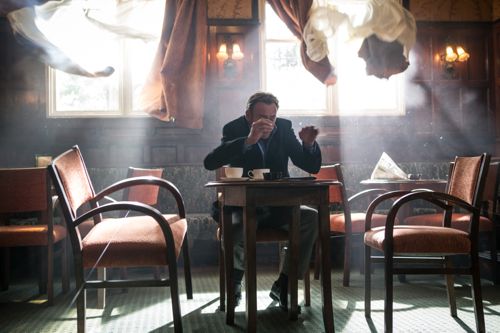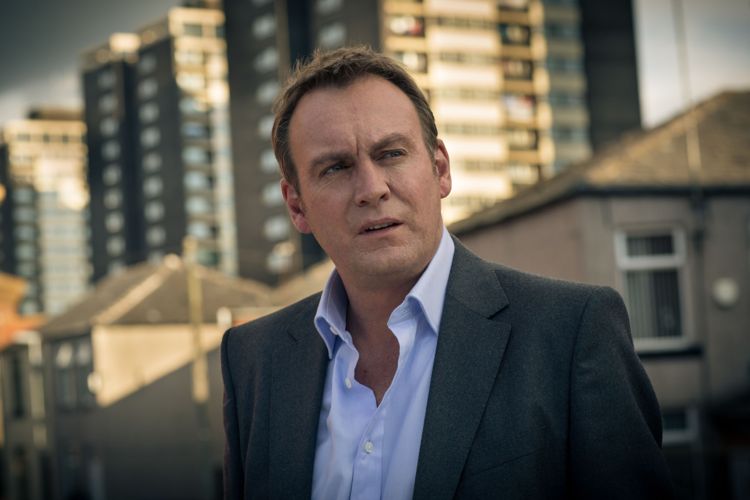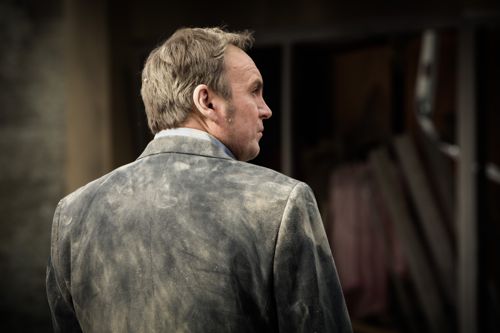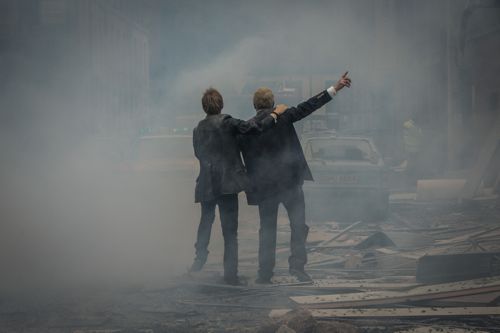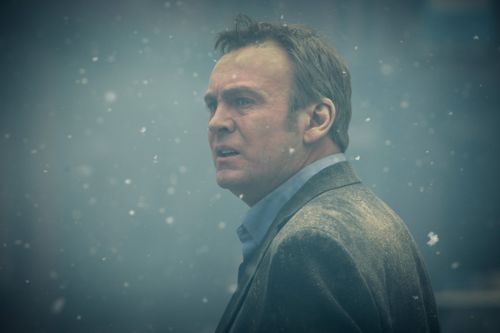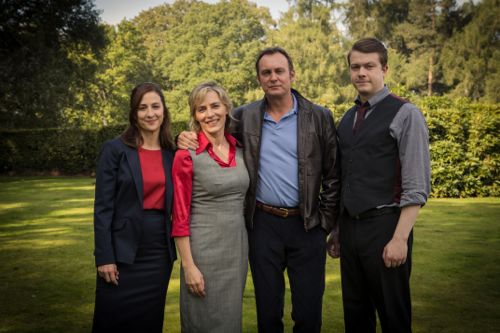“WE nearly died in there. Doesn’t it make you think?”
Daniel Cotton (Philip Glenister) asks the question of his father Samuel (Bernard Hill) in From There To Here.
The three part BBC1 drama, written by Peter Bowker, opens with the June 1996 Manchester bomb which destroyed a large part of the city centre.
But this is not a story about the IRA attack. It charts the ripples of that initial trigger on two families across Greater Manchester and Cheshire.
Last night I attended a screening of episode one at BAFTA in London followed by a Q&A, including Phil and Pete.
You can read my full transcript below, edited very slightly to remove any major spoilers.
Including Phil and Liz White talking about being reunited in Manchester where they, of course, filmed Life On Mars together.
And Phil’s response to an attempt to grab a cheap headline from him.
On the evidence of the first hour and the showreel of later highlights we were also shown, this is one of the best things Phil has done in recent years.
BBC Drama boss Ben Stephenson, who was at university in Manchester in 1996, described it as “a towering, moving, really surprising performance”.
Director James Strong, whose previous credits include Broadchurch, told the Q&A how he experienced the 1996 blast for real in Manchester that day.
He begins episode one with the closest look at Mr Glenister’s eyelashes you are every likely to get.
“Still alive,” Daniel remarks to wife Claire (Saskia Reeves).
Before he heads from their luxury Cheshire home to a Manchester city centre hotel where Daniel is hoping to broker a peace deal between his wayward brother Robbo (Steven Mackintosh) and their father Samuel.
Daniel having been adopted when he was around five years old.
It’s Saturday mid-morning and the hotel bar is otherwise empty, aside from cleaner Joanne, played by Liz White.
Who is a single mother of two boys.

You could hear that pin drop in the BAFTA auditorium when the bomb went off on screen.
Pete’s script then follows those ripples from that summer of football, through New Labour’s triumph in 1997 to the Millennium celebrations as 1999 turned into 2000.
There is much to love about From There To Here.
Not least the slices of humour, such as Daniel’s immediate thought after the explosion.
The music, including classics like I Wanna Be Adored by The Stone Roses and an original score by I Am Kloot.
Both of which capture the smell and feel of Manchester.
Samuel is the head of Cotton’s Confectionary, a Chadderton sweet factory, where Daniel also works.
With shades of Phil back in Clocking Off’s Mackintosh Textiles.
Daniel Rigby and Morven Christie co-starring as Daniel and Claire’s childen Charlie and Louise.
From There To Here begins on BBC1 at 9pm on Thursday May 22.
******************************************************************
Q&A with director James Strong / writer Peter Bowker / executive producer Derek Wax / Philip Glenister / Saskia Reeves / Liz White. Chaired by James Rampton.
Q: Derek – tell us how you developed this project?
Derek Wax: “Pete and I worked together on a show called Occupation, a three-parter also about the stresses of family and trauma within a family. We just started talking. Pete said he wanted write a big modern…like a modern Dickens novel, wasn’t it? A sort of tragi-comic modern epic about Manchester. This was just after Occupation came out about 2009, probably. We both talked about the novel American Pastoral by Philip Roth and we both loved that book and it was about a family that were involved in making something, a manufacturing business. And I remember you (Pete) wanted it to be a family sweet factory. And I said, ‘Couldn’t it be something a bit nobler than sweets? Couldn’t it be leather shoes or something?’ Sweets being something which you can feel pretty worthless but they’re fun. Out of that the thing was born. Pete came up with this fantastic story. Again about a family and all the epic canvas of Manchester. So the bomb was a trigger and a catalyst but not the story.”
Q: Obviously the bomb is a very dramatic opening. Why did you decide to use that as the opening and how did you develop it from there as a catalyst for the story?
Peter Bowker: “First, I wanted to write something about that summer because of the contradictions in it. You’ve got this very feelgood factor around Euro ’96. And then I remember the Manchester bomb happening. I’d mis-remembered it. I’d parked it. I didn’t think it was at the same time as the tournament. It happened some time that summer. And it was interesting that the Manchester re-build was done of the back of…riots or terrorism were the only way you could get a northern city re-built…but Scousers had already rioted. Is that potentially libellous? So there was an interesting contradiction. That you had a rock solid ‘Northern People’s Republic of Mancunia’ being invested…re-built itself in a very dynamic and capitalistic and entrepreneurial way. And the speed with which it all happened. There’s a great book called Rebuilding Manchester, written by an architect – the speed with which everything went through planning and everything. And being Manchester, rumours had started by that afternoon…by that afternoon there was a rumour. By Sunday it was an inside job. People in Manchester were saying, ‘How else are we going to get rid of the Arndale Centre?’ We tell stories. That’s what we do all the time. So there’s a kind of conspiracy theory. Part of Robbo’s character was that thing about the people outside the red line. The people whose businesses were still screwed but didn’t get compensation. The resentment of that as well. Obviously what I didn’t want to do was write a docu-drama about the day of the bomb and I didn’t want to belittle the experience of people who’d gone through that trauma. I suppose the central question is, ‘I could have died. How does that make me feel for the rest of my life? In that moment, if Robbo stood one side or the other he would have died, what does that do to you? And it takes them all off in different directions. That’s why it seemed such a powerful starting point.”
Q: Phil – what appealed to you when you first read Pete’s script?
Philip Glenister: “The script. For me it’s always in the writing. We all come from a perspective where we have something to work with. The writer comes with a blank page and we all work off that, whether directing, acting, set design, producing, whatever. Obviously I’ve known Pete for quite a few years. We’re neighbours, you see. So I just used to annoy him and knock on his door – play Knock Down Ginger until he gave me a part.”
Peter Bowker: “I used to hide behind the settee.”
Philip Glenister: “Yeah. I used to peer through. ‘Pete, Pete, can I have a job?’ (laughter) I think what I love about Peter’s writing is, the ambition is all his characterisation. It’s all in the characters. And for an actor it’s an absolute gift. You sit there in a read through and you don’t have to change pretty much anything. We had a week’s rehearsal where we just sat round and chatted and had quite a long lunch, courtesy of Derek. (laughter). It was a great part and a chance for me to go back to Manchester as well, which was a great appeal. Because obviously Manchester has been incredibly important for me as a city and for my career. It’s like my second home in many respects. I felt I’ve done some of my best work, without a doubt, there. Hopefully this adds to the gig. So it was a good gig. And obviously to get the chance to work with (comedy actory voice) marvellous, marvellous, darling actresses Saskia and Liz. Obviously Liz and I worked together on Life On Mars and so it was a really fantastic, enjoyable shoot. It was seven weeks and it flew by. Helmed by old ‘Strongy’ over there. All the elements just seemed to come together. It was just a really, happy, enjoyable…hard working. We did work hard. But it was great. Real fun.”

Q: Saskia – what drew you to the project?
Saskia Reeves: “The same as Phil. The writing was so strong and I loved the humour – the complication and the confusion of it. Reading it knowing that I was possibly going to be playing Claire, it was sort of, ‘Oh no, he’s doing that. And he’s said that.’ For me, I really loved the way she ended up in the story. Which you’ll find out if you watch two and three. I just loved the dark humour and the clearly drawn characters from everybody. I loved also the family, just the lovely family set pieces which we did at the beginning of the shoot. It was great to have that as a feeling to carry through all the other scenes. They were great fun to do. The breadth of emotion as well.”
Philip Glenister: “It’s about families. The bottom line. It’s about family and the complexities and the heartache and the humour and the extraordinary thing that is family, which we can all relate to because we’re all from them. Well, most of us. (laughter) And it’s that depth and complexity that is so extraordinary and amazing.”
Derek Wax: “Without trying to analyse Pete’s writing…You (Peter) said when we were making Occupation, that was about the gap between what people experience and what they articulate. I think Pete writes those characters better than anyone. That sense that people are trying to articulate profound feelings but not being able to. And other people being able to articulate things just like that. Snapping ideas out as soon as they come into their heads. And you have that incredible contrast with Daniel, who’s going through all sorts of stuff, that only comes out very obliquely and it remains enigmatic. Capturing inarticulate characters is a great strength of Pete’s.”
Q: Is it particularly a problem with male inarticulacy do you think? Our inability to express what we’re really feeling?
Peter Bowker: “I think it’s general. I don’t think human beings are very good at communicating, full stop. And that’s good for me because it gives me a living. Humanity. I also just wanted to say about the family set pieces that it takes an incredibly skillful director to just let them sit. And there are a number of set pieces in this where the way James films those family moments. when everybody’s got an agenda, but he films it in such a way that they don’t put their agendas out there. This came together for me…the Euro ’96 thing helped because talking about football is another way about talking about emotion. I know my dad never said he loved me, because he was from Salford. But he took me to the match. And that’s what I confuse with love.”

Q: Liz – tell us about your character (Joanne) and what appealed to you about her?
“The line that pinged out when we were watching it then was, again, ‘I don’t need saving.’ I loved that about her character and the fact that she’d brought up these boys by herself and she’d reached a point in her life where it seemed on paper that she was functioning brilliantly and she certainly didn’t need anybody in her life. But along came this guy under these circumstances and it’s almost like it was the fairytale that we’ve all got within us. Which was, perhaps this knight in shining armour has come and knocked at my door? And in this circumstance, there’s just been a bomb and death is a bit of an aphrodisiac and so why not? You really lose potentially everything. It was a great woman on the page and I really wanted to play her. I was so thrilled to get that opportunity.”
Q: James – you were there in Manchester on the day of the bombing?
James Strong: “Yeah, I was training as a director at Granada and I went into Manchester, I think in an England shirt. And I was walking down Deansgate and it was a beautiful sunny morning. Then I remember right at the other end there was this bang and then the windows started going out at the other end of the road. And then I was lying on the floor. I got up and it was silent after that for about a minute. Then all the sirens and police and stuff. So when I got the script – well, I think I can bring along some experience. So we had to read it and then go to meet everybody and then know I was there. Also living in Manchester, that actually by the afternoon it was more about England v Scotland than what had happened.”
Peter Bowker: “What’s remarkable is that Old Trafford did host a match on the Sunday afternoon…that says something about the era that, I think, is very different to where we are now. I just can’t imagine that being cancelled or more being made of the fact it went on. It was under-reported. It (the bombing) felt nationally under-reported because there was this other big narrative going on and nothing was going to interrupt that. Even for the people involved. And when Samuel, the Bernard Hill character, says, ‘Make sure you’re home for the match,’ that seems entirely believable to me. That’s where your priorities would be.”
Derek Wax: “And given the circumstances, 80,000 people were actually evacuated in two hours. It could have been a horrendous loss of life on that day. A mixture of the Greater Manchester Police and the extraordinary evacuation of the Arndale Centre. 80,000 people were evacuated. And it was, in terms of explosive energy, the largest peacetime bomb every exploded in the UK. An over 3,000 lb bomb. But no-one was killed.”
Q: Those scenes are very vivid and very powerful. Were they hard to make and were you aware of local sensibilities?
James Strong: “I think you have to be aware of getting it right and as accurate as you can. There’s lots of photographs and there’s lots of archive. The police have lots of records. And our brilliant production designer. We studied them all and we made it all as accurate as we could. You do feel a responsibility to get it as accurate as we can.”
Q: And I understand you had a very good reception in Manchester last night? What did people in Manchester say about it?
Peter Bowker: “As James said, people were mainly concerned that the detail and the feeling – the emotion of the immediate aftermath they were concerned about and once it was seen that we weren’t trying to trivialise it in any way. I think there was a general story of relief that we took the story off in the direction we did. I think if we’d done something that dwells on the day of the tragedy and maybe people not recovering or reacting in a more conventional way, it would have stirred up more local sensibilities. But there’s a sense of ownership around Manchester of portraying Manchester full stop. It’s getting that right. They’d have been as concerned if you’d used the wrong music in the club. It’s getting detail right. When you’re saying Manchester is a character in this drama, then you’ve got to get the detail right across the board. Otherwise you’re not doing your job.”
Liz White: “One woman said it was really nice to see a drama set in Manchester that didn’t involve someone getting murdered.”
Derek Wax: “Someone picked up on the fact that it was about the emotional ripples of the bomb. The shock waves. As Pete says, it’s not a story about post-traumatic stress or the obvious effects of the bomb. It’s about the emotional effects – effects that you don’t quite understand. It’s not an obvious consequence of the bomb.”
Saskia Reeves: “The bomb is like an outward expression of what happens to Daniel in his life. For me, also what was interesting about Claire is her marriage to Daniel and how much did she guess or not guess. I found it really interesting talking to myself about how much is she responsible in a relationship when something goes so off like that. I found all that really interesting to think about.”
Q: You called it a love letter to Manchester, Pete. Could you expand on that?
Peter Bowker: “Obviously everything I do is probably a love letter to Manchester in the end. Actually I wanted to capture something that was about the relationship between the suburbs and Manchester. I grew up in the suburbs and most people do – and that sense, if you grow up in the suburbs, that something very exciting is happening in that city centre and you want to be part of that. Whereas if you are part of it like Robbo, you’re probably ******. It’s that strange relationship between the allure of the dark streets and the danger that attracts you. Whilst living, actually, getting the night bus, the 192, to the suburbs. And again the way James has shot, the sense that you’re in green pastures. But feels that his (Daniel) life is essentially dull. One of the reasons he’s baling out his brother is he wants to feel he’s part of that. But in terms of Manchester city, it’s a kind of celebration of the spirit of the place and all these conflicting wishes. Tony Wilson was a great myth-maker for the city. And there’s all sort of (inaudible) in Manchester which basically claim that we invented everything – a picture of a cave man with a wheel is clearly Mancunian. (laughter) And, again, there’s a comedy to that local pride and I wanted to capture that. So in that respect, that’s how it’s a love letter and a love letter to that era and that summer.”
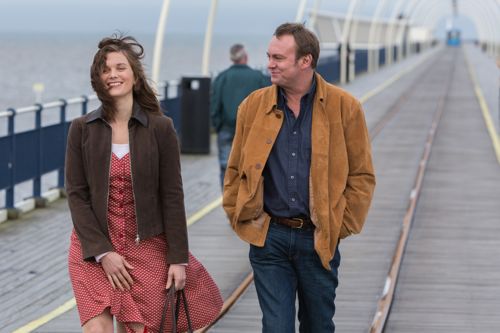
James then opened up questions to the audience:
Q: (From me) While I perhaps should ask Pete why he didn’t use dramatic license to change the result of that (England v Germany) penalty shoot out…can you expand, Pete, on the themes of second chances or fresh chances?
Peter Bowker: “There’s a great irony at the centre of that day. And it’s that this terrible thing that happened in the morning, the bomb, allowed Manchester to re-invent itself yet again. And so this very bad thing caused good things to happen. And that the myth of Euro ’96 being a new start for English football and that was clearly the stepping stone and we were going to be winning the World Cup within four years…I’m not saying that they occupy a moral equivalence by the way…so I think this kind of irony. Sport is full of second chances and life is rarely full of second chances. So that’s the kind of parallel I’m trying to draw. I want people to judge particularly how the women are portrayed over the three hours, rather than the first hour. The women aren’t dupes. It’s not all about Daniel’s angst and, ‘Oh, this poor man torturing himself by doing what he likes.’ There is some comeback. There’s considerable comeback. And I suppose it’s wanting to portray that thing where you’ve taken for granted what you’ve got at home for a long time then something is shifted in you that allows certain other chances to be made. Robbo, in a way, is the comedic equivalent of that.”

Q: A question for Phil – a slightly nerdy, motor car question. How was this Audi to drive compared to the Quattro in Ashes To Ashes?
Philip Glenister: “She was a babe. Well it wasn’t as old, for a start. It didn’t break down as much. I don’t think it broke down at all, actually. For me, it was quite a recent car. The fact that it happened to be an Audi was purely co-incidental. It wasn’t planned. It was all right.”
Q: I wanted to ask Phil and Liz if they found it strange working in Manchester together again (after Life On Mars). Did they recognise many of the locations?
Liz White: “Yeah, we did. The street that Joanne lives on we used in Life On Mars. We’d often point out locations to each other and anyone else who wanted to listen.”
Philip Glenister: “It’s true. I remember I bored Daniel (Rigby) and whoever was in the van on the way to our house, which was in Cheshire…Knutsford…it was about 40 minutes. So we used to go past all these places and go, ‘That was series one, episode two…Manc Way…’ And I’d go into detail to Daniel and I’d just see him…the earphones would go on. Sorry Dan.”
Derek Wax: “I just want to pay tribute to the other fantastic cast members who are not on the panel but..Daniel Rigby, who plays Charlie, who’s here tonight and was in Manchester with us last night. And Morven Christie, who played Louise and Steven Mackintosh who is fliming away. And Bernard Hill, who is thousands of miles away in New Zealand.”
Peter Bowker: “The main thing about Bernard Hill is…so you’ve got two alpha males in Phil and Steven, and we needed someone who was going to scare even them. There’s only one man for the job. Bernard Hill.”
Philip Glenister: “He scared the life out of the crew when he parked his car on somebody’s lawn. Day one.”
Derek Wax: “It was the first day of the shoot. He insisted on driving to set and he drove straight on to the lawn.”
Philip Glenister: “Of his own (screen) house. The house you see him in…a beautifully manicured lawn. Straight in with this four by four.”
Peter Bowker: “He never smiles, Bernard, when he’s joking. So we were on set on the day we were doing the big set piece where the two…guys are looking at the plume of smoke. I was standing with Bernard and this real policeman was talking to him making small talk. And Bernard was giving nothing back. He said, ‘And how long is it since Boys From The Blackstuff?’ And Bernard went, ‘We’re not doing Boys From The Blackstuff.’ Then nothing. I’m going, ‘It’s 19 years, isn’t it…?’ Then Bernard got me by the arm and he walked me across and said, ‘I got you out of that…’” (laughter)
Q: The use of music is brilliant. Why is the music so important?
James Strong: “Well, it was so important to the era. Manchester was famous for its music and so that was something we had to get right. We had a lot of help from our music producer and I Am Kloot, who did the score. We wanted to get a modern Mancunian sound and so they gave us that, which was brilliant stuff. But then all the period music, obviously everyone knows and loves it. It was just a joy to get it all together. But, yeah, it’s very important to the Manchester of that time.”
Q: I apologise – this is another nerdy question for Phil. If Gene Hunt were around today, do you think he could be persuaded to stand for UKIP?
Philip Glenister: “Are you from the Daily Mail?’ (laughter)
Q: “No.”
Philip Glenister: “You should be….I don’t think I can answer that one, sir. God knows. No. In a word.”

